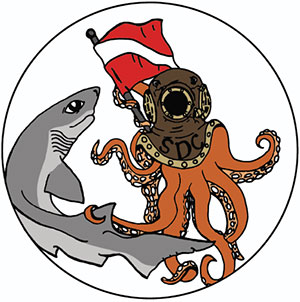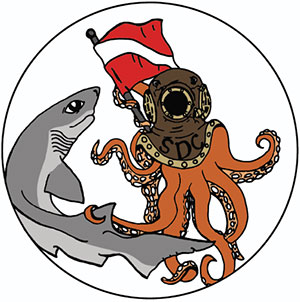I've always wanted to learn to SCUBA dive. How do I get started?
Read the following frequently asked questions below, and if you have any lingering unanswered questions we are here to help! Give us a call or come by in person. If you are sure you are ready to get started with SCUBA diving, sign up for our Basic Open Water Course.
Is it difficult to learn how to SCUBA dive?
It may be easier than you imagine — especially if you are already comfortable in the water! Sound Dive Center’s entry level course consists of knowledge development, pool diving, and open water dives. The course is designed for you to become comfortable with each skill before moving on to the next, and our NAUI Instructors take care to observe, teach, and equip each student to become a comfortable, competant, and confident SCUBA diver.
I'm not sure I will like it...
We have an option for you! Try Scuba Diving is a low-cost entry point into SCUBA diving! The Try Scuba student will work with a dive professional in the pool environment to discover how it feels to be breathing air while underwater!
How long does it take to become a certified diver?
We hold courses every month, all year long! The class time is a total of six days spread over three weeks split into three sections: Lectures, Skills, and Open Water Check Out. Typically the schedule begins in the first week of the month with Day 1 being on the first Thursday and held at Sound Dive Center. Then the following Saturday is Day 2 at the the Olympic Aquatic Center learning and practicing skills in the pool. The Thursday/Saturday sessions will repeat for the second week. The third week both Saturday and Sunday sessions are held at Illahee State Park* for the required check out dives in the open water.
*You will need a Washington State Park Discover Pass for each day. We recommend purchasing an annual pass if you do not already have one.
Sign up for the next class: Open Water Diver Course.
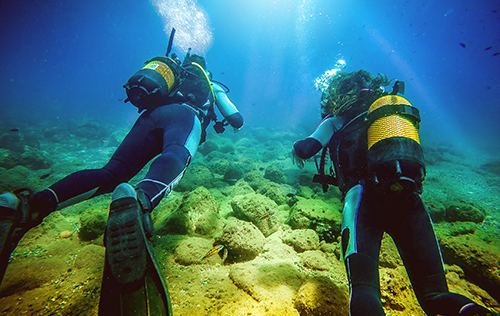 How old do I have to be to become a certified diver?
How old do I have to be to become a certified diver?
A student must be at minimum ten years old to receive a Junior Open Water Diver Certification. However, due to the serious nature and maturity required for safe diving we prefer students to wait until 12 years old to undertake the course. If a young person believes they are fit and able to handle the physical and mental demands of this sport, we can work with them and their parent to coordinate an interview with the instructor to determine readiness.
Are their any special requirements or age considerations necessary prior to taking a SCUBA class?
Not Necessarily. Age is not a determinant of ability! Review the medical questionairre and if anything on the questionnaire indicates a reason to be cautious about diving, you’ll need check with a physician to make sure you can dive safely.
Do I have to be a great swimmer to be certified as an Open Water Diver?
You do need to be a reasonably proficient swimmer and comfortable in the water. You must swim 150 feet without gear OR 450 yards with mask, fins and snorkel; as well as swimming underwater for 15 meters (50 feet) in one breath without pushing off or diving. You’ll also need to perform a 10 minute tread/float.
Isn't SCUBA diving super expensive?
SCUBA diving has larger initial upfront costs, like many hobbies, and depending upon your interest level the costs associated with continual enjoyment of the sport can be varied. Most people find the costs of scuba diving similar to the cost associated with golfing or snow skiing.
What equipment do I need to have to take SCUBA lessons?
We encourage everyone to train in their own gear. The best dive is a safe dive, and training in ill-fitting gear is unsafe. We recognize that costs of gear can be a barrier to entry in the sport and have selected specific gear to be discounted for our students. This package includes: mask, snorkel, gloves, boots, SMB, Finger Reel, and fins. The staff at Sound Dive Center can help you select quality equipment that fits properly.
Why should I buy gear directly from the dive shop?
There are a lot of good reasons for making your gear purchases directly with the local dive shop. A few to consider: warranty, fit, and long term goals. When you buy gear from name brands through the local dive shop there is a direct connection to the vendor, so if something were to malfunction in your first couple of dives, you can bring it back to the shop and we will work directly with the brand to secure you a repair/replacement if appropriate. When you purchase gear from unverified third parties or second hand, then what you get is what you get, As Is. This has often led people to waste their time and spend more money on the product getting serviced or needing to buy something entirely different altogether.
A surefire way to ruin your dive experience is to have ill-fitting equipment. When you shop through the local dive store you will be working hands-on with an experienced diver who understands what a proper fit is and how to select the best option for you. The main concern for most customers when considering where to make their purchases is often price, but too often there's an element of cost missing from the equation! People forget to account for the primary factor of what it takes to enjoy scuba diving: AIR! When gear purchases are made via online retailers instead of through the local dive store the customer actually inadvertantly makes it more challenging for the local dive shop to stay in business and be able to provide them air fills. What seems like an easy way for someone to save $20 now by scouring websites for the cheapest xyz piece of gear is part of the reason 5 years from now that same customer may have to drive more than an hour just to get air in their cylinders. Keep the big picture in mind and try to make the wisest overall choice when you purchase your gear.
What is in a scuba tank? Oxygen?
While this is a common, albeit incorrect, conception, recreational Open Water SCUBA divers breathe air, never pure oxygen. Ambient air is comprised of approximately 78% Nitrogen, 21% oxygen, and 1% inert gasses. Our compressor brings in the ambient air, filters it to remove impurities, and then compresses it for underwater use. So the air you breathe from your scuba tank it is just like the air you’re breathing only better!
How long does a tank of air last?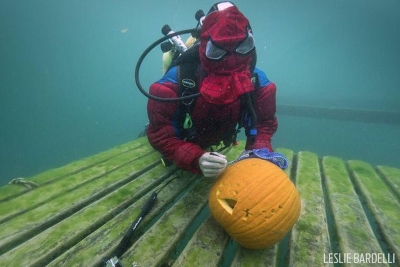
Since people are different ages, sizes, and physical condition, they breathe at different rates. As you go deeper you use air faster, so each dive is different. Divers carry a pressure gauge and/or dive computer that lets them know how much air is in their tank. As divers gain more experience and relax, our “bottom time” will improve. Divers can expect a 30 minute to one hour underwater time when diving to 40 to 90 ft with an average 80cf tank.
Why do my ears hurt when I dive down?
This ear pain comes from the water pressure on your eardrum. In your SCUBA course, you’ll learn to love the phrase, "Clear Early and Often". We teach simple techniques to “equalize” your ears to the surrounding pressure, much like you do when you fly in an airplane, which prevents ear pain.
Aren't sharks and other animals dangerous?
Marine animals are typically passive or timid. A few do bite when provoked, or sting when intimidated or put in a defensive mode. What to do? Always be alert and cautious when entering the aquatic natural wonderland. Don’t provoke them or invade their “space.” We are their guests and it is a privilege to explore their home.
Is SCUBA diving dangerous?
There are potential hazards and inherent risks, as with any sport, which is why proper training and certification is necessary.
I wear glasses or contacts, so will I be able to see underwater?
We have options for masks that need corrective lenses which can either be specially ground to your exact prescription or get replacement lenses. If you would prefer to wear your soft contact lenses, under your regular mask, no problem. Hard contact wearers should use gas permeable lenses. Be aware, some skills will require water in your mask.
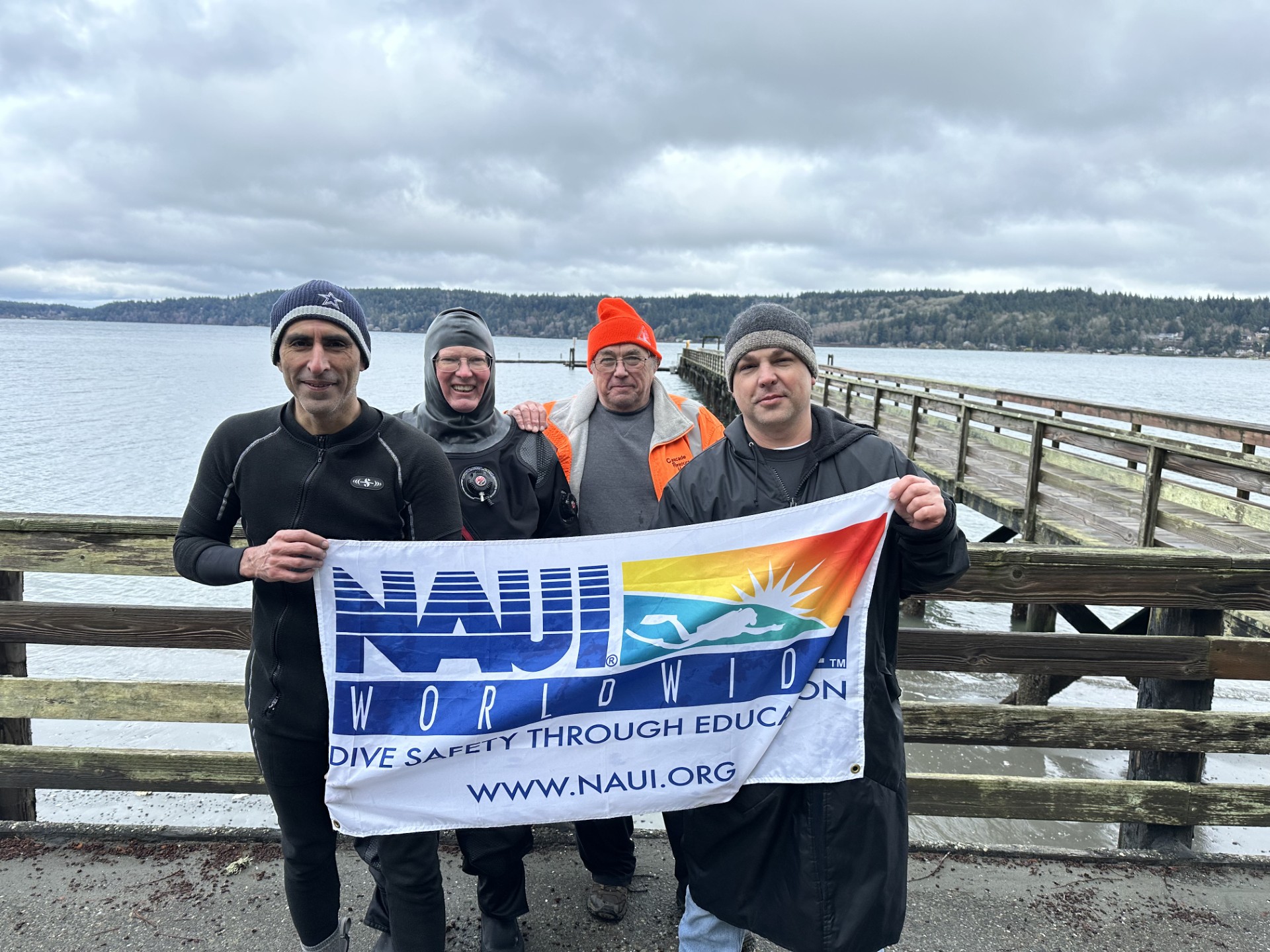 Is tipping required? How much?!
Is tipping required? How much?!
No, tipping is not required. However, as with most areas in the customer service industry, tipping Dive Professionals is an accepted practice of generosity for excellent service. The customary standard is like that of food service with $10/tank for dive guides, and 15%-20% of class costs for instructors.
Who is NAUI?
NAUI is the acronym for the National Association of Underwater Instructors. NAUI’s global reputation for being among the best in training and educational products reflects our core values of quality dive training through education. Many organizations specifically choose NAUI for their diver education programs including Walt Disney World Resort in Orlando, Florida, United States Navy SEAL Teams, and NASA’s Neutral Buoyancy Laboratory in Houston, Texas (USA) where astronauts train for their space walks.
Have a question that wasn't listed? Come by the shop or give us a call and we will be happy to connect with you!
